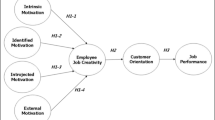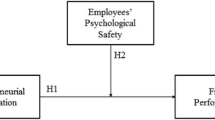Abstract
Managing stakeholders is an important managerial aspect of corporate social responsibility. Employee stakeholder is one of the primary stakeholders that are critical to a company. Previous studies have shown inconclusive findings regarding the performance impact of managing this stakeholder, with some identifying little impact while others finding a positive association. This study further explores this issue in the context of foreign companies’ subsidiaries in China. A potential mediating mechanism (i.e., customer orientation) between employee stakeholder orientation and performance (both financial performance and innovation performance) was proposed; a sample of 103 Chinese subsidiaries of foreign companies which have new product development responsibilities was used to test hypotheses. A subsidiary’s employee orientation was found to show a significant positive relationship with its product innovation performance, but no significant relationship with its financial results. Moreover, employee orientation showed a significant indirect relationship with both performance outcomes through customer orientation.
Similar content being viewed by others
Abbreviations
- CSR:
-
corporate social responsibility
References
Ahmed, P.K. and M. Rafiq: 1993, ‘The Scope of Internal Marketing: Defining the Boundary between Marketing and Human Resource Management’, Journal of Marketing Management 9(3), 219 –32.
Armstrong, J.S. and T.S. Overton: 1977, ‘Estimating Non-response Bias in Mail Surveys’, Journal of Marketing Research 24 (August), 396-402.
Baker, D., C. Grenberg and C. Hemingway: 2006, What Happy Companies Know (Pearson Education Inc., Upper Saddle River, New Jersey).
Barnett, M.L.: 2007, ‘Stakeholder Influence Capacity and the Variability of Financial Returns to Corporate Social Responsibility’, Academy of Management Review 32(3), 794-816.
Barney, J.B. (1991) ‘Firm Resources and Sustained Competitive Advantage’. Journal of Management 17 (1):99–120.
Baron, R. and D.A. Kenny: 1986, ‘The Moderator-Mediator Variable Distinction in Social Psychological Research: Conceptual, Strategic, and Statistical Considerations’. Journal of Personality and Social Psychology 51 (6), 1173–82.
Berman, S.L., A.C. Wicks, S. Kotha and T.M. Jones: 1999, ‘Does Stakeholder Orientation Matter? The Relationship between Stakeholder Management Models and Firm Financial Performance’, Academy of Management Journal 42(5), 488-506.
Berry L.L, J.S. Hensel and M.C. Burke: 1976, ‘Improving Retailer Capability for Effective Consumerism Response’, Journal of Retailing 52(3), 3–14.
Bjorkman, I., A. Amale, J. Sumelius, V. Suutari and Y. Lu: 2008, ‘Changes in Institutional Context and MNC Operations in China: Subsidiary HRM Practices in 1996 versus 2006’, International Business Review 17, 146-158.
Brockman, B. K. and R. M. Morgan: 2003, ‘The Role of Existing Knowledge in New Product Innovativeness and Performance’, Decision Sciences 34, 385-419.
Calantone, R. J. and A.C. Di Benedetto: 1988, ‘An Integrative Model of the New Product Development Process: An Empirical Validation’, Journal of Product Innovation Management 5(3), 201-216.
Cantwell, John, Ram Mudambi: (2004) ‘Multinational Enterprises and Competence-Creating Knowledge Flows: A Theoretical Analysis’. In: Volker Mahnke & Torben Pedersen (ed), Knowledge Flows, Governance and Multinational Enterprise. Palgrave Macmillan, pp.38-60.
Clarkson, M.: 1995, ‘A Stakeholder Framework for Analyzing and Evaluating Corporate Social Performance’, Academy of Management Review 20, 92–117.
Conduit, J. and F.T. Mavondo: 2001, ‘How Critical is Internal Customer Orientation to Market Orientation?’, Journal of Business Research 51(1), 11-24.
De Luca, L.M. and K. Atuahene-Gima: 2007, ‘Market Knowledge Dimensions and Cross-Functional Collaboration: Examining the Different Routes to Product Innovation Performance’, Journal of Marketing 71(1), 95-112.
Deshpande, R., J.U. Farley and F.E. Webster: 1993, ‘Corporate Culture, Customer Orientation, and Innovativeness in Japanese Firms: A Quadrat Analysis’, Journal of Marketing 57 (January), 23-37.
DiMaggio, P. J. and W.W. Powell: 1983, ‘The Iron Cage Revisited: Institutional Isomorphism and Collective Rationality in Organizational Fields’, American Sociological Review 48(2), 147–160.
Ding, D.Z. and M. Warner: 2001, ‘China’s Labor-management System Reforms: Breaking the ‘Three Old Irons’(1978-1999)’, Asia Pacific Journal of Management 18(3), 315-334.
Freeman. R.E.: 1984, Strategic Management: A Stakeholder Approach (Prentice-Hall, Englewood Cliffs, NJ).
Fryxell, G.E., R.S. Dooley and W. Li: 2004, ‘The Role of Trustworthiness in Maintaining Employee Commitment During Restructuring in China’, Asian Pacific Journal of Management 21, 515-533.
Gounaris, S.P.: 2006, ‘Internal-market Orientation and Its Measurement’, Journal of Business Research 59(4), 432-448.
Han, J.K., N. Kim and R.K. Srivastava: 1998, ‘Market Orientation and Organizational Performance: Is Innovation a Missing Link?’, Journal of Marketing 62 (October), 30–45.
Harrison, J.S. and R.E. Freeman: 1999, ‘Stakeholders, Social Responsibility, and Performance: Empirical Evidence and Theoretical Perspectives’, Academy of Management Journal 42(5), 479-485.
Hillman, A. and G. Keim: 2001, ‘Shareholder Value, Stakeholder Management, and Social Issues: What’s the Bottom Line?’, Strategic Management Journal 22(2), 125–139.
Husted, B.W.: 2005, ‘Risk Management, Real Options and Corporate Social Responsibility’, Journal of Business Ethics 60, 175–183.
Im, S. and J.P. Workman: 2004, ‘Market Orientation, Creativity, and New Product Performance in High-Technology Firms’, Journal of Marketing 68 (April), 114–32.
Janz, B.D. and P. Prasarnphanich: 2003, ‘Understanding the Antecedents of Effective Knowledge Management: The Importance of a Knowledge-Centered Culture’, Decision Sciences 34(2), 351-385.
Johnson & Johnson Inc., http://www.jnj.com/connect/about-jnj/jnj-credo/?flash=true. Retrieved Dec 2, 2009.
Kassinis, G. and N. Vafeas: 2006, ‘Stakeholder Pressures and Environmental Performance’, Academy of Management Journal 49(1), 145-159.
Kirca, A.H., S. Jayachandran and W.O. Bearden: 2005, ‘Market Orientation: A Meta-Analytic Review and Assessment of Its Antecedents and Impact on Performance’, Journal of Marketing 69 (April), 24–41.
Kuvaas, B.: 2008, ‘An Exploration of How the Employee-Organization Relationship Affects the Linkage Between Perception of Developmental Human Resource Practices and Employee Outcomes’, Journal of Management Studies 45(1), 1-25.
Lings, I.N. and G.E. Greenley: 2005, ‘Measuring Internal Market Orientation’, Journal of Services Research 7(3), 290– 305.
Litwin, G.H. and R.A. Stringer: 1968, Motivation and Organizational Climate (Harvard University Press, Boston).
Luk, C.L., Oliver H.M. Yau, Raymond P.M. Chow, Alan C.B. Tse and Leo Y.M. Sin: 2005, ‘Stakeholder Orientation and Business Performance: The Case of Service Companies in China’, Journal of International Marketing 13(1), 89-110.
Luo, Y.: 2003, ‘Market-seeking MNEs in an Emerging Market: How Parent–Subsidiary Links Shape Overseas Success’, Journal of International Business Studies 34, 290 – 309.
Luo, Yadong and Seung Ho Park: 2001, ‘Strategic Alignment and Performance of Market-Seeking MNCs in China’, Strategic Management Journal 22, 141-155.
Makino, S., and A. C. Inkpen: 2003. Knowledge Seeking FDI and Learning Across Borders. In: M. Easterby-Smith and M. A. Lyles (eds.), The Blackwell Handbook of Organizational Learning and Knowledge Management. Oxford: Blackwell Publishing, pp. 233-252.
Maxfield, Sylvia: 2007, ‘Reconciling Corporate Citizenship and Competitive Strategy: Insights from Economic Theory’, Journal of Business Ethics 80, 367-377.
McWilliams, A. and D. Siegel: 2001, ‘Corporate Social Responsibility: A Theory of the Firm Perspective’, Academy of Management Review 26, 117–127.
Mitchell, R., B. Agle and D. Wood: 1997, ‘Toward a Theory of Stakeholder Identification and Salience: Defining the Principle of Who and What Really Counts’, Academy of Management Review 22, 853–886.
Plakoyiannaki, E., N. Tzokas, P. Dimitratos and M. Saren: 2008 ‘How Critical is Employee Orientation for Customer Relationship Management? Insights from a Case Study’, Journal of Management Studies 45(2), 268-293.
Podsakoff, P. M. and D.W. Organ: 1986, ‘Self-reports in Organizational Research: Problems and Prospects’, Journal of Management 12(4), 531−544.
Porter, M.E. and M.R. Kramer: 2006, ‘Strategy and Society: The Link between Competitive Advantage and Corporate Social Responsibility’, Harvard Business Review 84(12), 78-92.
Reinartz, W., M. Kraft and W.D. Hoyer: 2004, ‘The Customer Relationship Management Process: Its Measurement and Impact on Performance’, Journal of Marketing Research 41, 293–305.
Robertson, C.J.: 2008, ‘An Analysis of 10 years of Business Ethics Research in Strategic Management Journal: 1996-2005’, Journal of Business Ethics 80, 745-753.
Slater, S.F. and J.C. Narver: 1994, ‘Does Competitive Environment Moderate the Market Orientation–Performance Relationship?’, Journal of Marketing 58(January), 46–55.
Sobel, M.E.: 1982, ‘Asymptotic Confidence Intervals for Indirect Effects in Structural Equation Models’, In S. Leinhardt (eds.), Sociological Methodology (Jossey-Bass, San Francisco), pp.290–312.
Song, Michael X. and Mitzi M.Montoya-Weiss: 1998, ‘Critical Development Activities for Really New Versus Incremental Products’, Journal of Product Innovation Management 15, 124-135.
Srivastava, R.K., T.K. Shrevani and L. Fahey: 1999, ‘Marketing, Business Processes, and Shareholder Value: An Organizationally Embedded View of Marketing Activities and the Discipline of Marketing’, Journal of Marketing 63(Special Issue), 168–79.
Standard Chartered Bank, press release (July 22, 2008), http://www.standardchartered.com.hk/news/en/index.html. Retrieved July 24, 2008.
Wasmer, D.J. and G.C. Brunner: 1991, ‘Using Organizational Culture to Design Internal Marketing Strategies’, Journal of Services Marketing 5(1), 35–46.
Author information
Authors and Affiliations
Corresponding author
Rights and permissions
About this article
Cite this article
Zhang, J. Employee Orientation and Performance: An Exploration of the Mediating Role of Customer Orientation. J Bus Ethics 91 (Suppl 1), 111–121 (2010). https://doi.org/10.1007/s10551-010-0570-6
Published:
Issue Date:
DOI: https://doi.org/10.1007/s10551-010-0570-6




